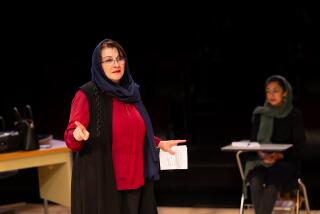‘History’ in eye of the beholder
What is the value of education, and how does it shape our understanding of the world? These are the questions posed by “The History Boys,” based on the hit play by Alan Bennett, directed by Nicolas Hytner and starring the original National Theater cast. A lively and entertaining disquisition on the purpose and uses of knowledge in a world that cares less about scholarship than quantifiable results, “The History Boys” asks us to ponder the moral consequences of reducing education to a tool for personal advancement, positing history as the infinitely malleable interpretation of recent events.
Set in a middle-class private boys’ school in Yorkshire in the 1980s, “The History Boys” is the story of a group of seven friends who find themselves in the unlikely position of being strong candidates for Oxford and Cambridge at the same time. Though the school’s pompous, results-obsessed headmaster (Clive Merrison) won’t acknowledge it, the boys owe their success to the efforts of two teachers, the dedicated, methodical Mrs. Lintott (Frances de la Tour) and the flamboyant, romantic Hector (Richard Griffiths), who instills his seemingly unfocused lessons in French and literature with a sense of antic fun.
At the beginning of their final year, during which the students will be coached to take their Oxbridge entrance exams, the headmaster brings in a flashy young teacher, Irwin (Stephen Campbell Moore), newly graduated from Oxford and full of ideas on “teaching to the test.” Whereas Hector’s classes are free-associative and seemingly aimless, mixing high culture and low culture in a way that brings them alive, Irwin’s approach is flashy and contrarian. Mrs. Lintott asks her students to consider history’s omissions (she likens it at one point to the experience of women watching men mess things up); Irwin presents it as an intellectual game to be rigged in one’s favor.
The contrast between the Old Guard and the new represents the tension between romanticism and pragmatism, between the search for truth and beauty and the shaping of reality to suit one’s needs. To the Oxbridge dons, the slick young Irwin insists, what will count is the spin the students can put on history, not their understanding of it.
“Looking back, immediately behind us is dead ground,” Irwin tells the boys. “We don’t see it, and because we don’t see it, there is no period so remote as the recent past. The historian’s job is to anticipate what our perspective of that period will be.”
If it is the function of art, and in particular literature, to teach us how to be human, then Hector and Lintott’s approach to teaching support this and counter Irwin’s more glib and facile views. Hector’s greatest fear is that the boys will see history and literature as dead objects instead of living expressions of who we are.
This tension applies to the characters’ personal lives as well. As played by the expansive, in every sense of the word, Griffiths, Hector’s idealism verges on the ridiculous, a fact of which he’s well aware. The impulsive Hector follows his (illegal) bliss without a thought to its consequences. Moore, by contrast, is taut and compact, and seems to expend an enormous amount of energy restraining his every natural impulse. Irwin’s cynicism creates a sense of alienation that’s palpable. The boys, meanwhile, radiate an energy, optimism and soulfulness that spills into every aspect of the movie.
Both teachers find themselves in love with the same boy, Dakin (Dominic Cooper), who learns early on how to use his physical charms to his advantage. The story is suffused in that public British schoolboy homoeroticism emblematic of the genre, but the subject is handled in a thoughtful, non-hysterical way that you’d never see in Hollywood versions of the sacred bond between pupil and teacher.
There’s a difference too in the dramatization of a well-imparted education. The teachers and pupils act and argue, mock one another and defend their positions in lively torrents of conversation. If the kids seem impossibly erudite, “The History Boys” is a paean to the possibilities of education, or a eulogy.
“I didn’t want to turn out boys who in later life had a deep love of literature,” Hector says. “Or who would talk in middle age of the lure of language and their love of words. ‘Words’ said in that reverential way that is somehow Welsh.” The headmaster, of course, speaks of “words” in precisely that way -- worse, he describes their value using capitalist jargon, insincerely crowing that Hector has made the boys “shareholders” in the corporation of English literature. The boys, as they will do, reach their own conclusions. But it’s the process of reaching them that makes them who they are.
*
MPAA rating: R, for language and some sexual content. Running time: 1 hour, 44 minutes. In general release.
More to Read
The biggest entertainment stories
Get our big stories about Hollywood, film, television, music, arts, culture and more right in your inbox as soon as they publish.
You may occasionally receive promotional content from the Los Angeles Times.










